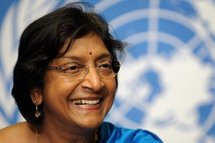
Navi Pillay
About 20 percent of the world's poorest people have some kind of disability, while 90 percent of disabled children in developing countries do not attend school, according to UN data.
"These statistics shock our conscience," said Pillay.
"Unless persons with disabilities are brought into the development mainstream, it will be impossible to cut poverty in half by 2015 or to give every girl and boy the chance to achieve a primary education," she added in a statement.
The UN Committee on the Rights of Persons with Disabilities, formed this year, said many national censuses simply failed to account for the disabled, effectively hiding the issues of care, support, opportunities and their rights.
Yet the number of people with physical and mental disabilities is thought to be growing, while forcible internment remains a major concern and the disabled are often stigmatised in some cultures, committee members warned.
"Disability is a cross-cutting issue and it must be included in the mainstream in our journey from darkness to light, from isolation to inclusion, from despair to hope," said committee member Monsur Ahmed Choudhuri, who is blind.
The UN expert spearheading the nascent global drive for disabled rights revealed that even he and his colleagues experience hurdles and discrimination, including in wealthy countries that are regarded as more progressive.
Mohammed al-Tarawneh, head of the committee overseeing the 2008 UN Convention on the rights of the disabled, said he was recently forced to fill in medical forms stating he was fit to fly on an airliner.
"This happened in two countries that are not only signatories but have ratified (the convention). I would like to mention the names Austria and Italy," said Tarawneh, who is physically disabled.
"This was so degrading, in the past 34 years of my life since I had my car accident, I have never been asked this question before.
"I was asked this question in Vienna, and they almost did not let me board the plane coming to Geneva, and leaving Geneva to Amman via Rome, the Alitalia representative refused to let me on board until I filled a claim (form)," he said.
One of his colleagues on the committee, Jia Yang, said she would be keeping check on her travel experience as she flew back to China.
"It's ironic, because he was on his way to Austria to receive a prize for his achievements for this committee, but he was hindered by those airlines," she added.
Jia, who is visually impaired, added: "On the other hand, Mohammed can fly, he took flying lessons."
----------------------------------------------------------------------------------------------------------------------------------
"These statistics shock our conscience," said Pillay.
"Unless persons with disabilities are brought into the development mainstream, it will be impossible to cut poverty in half by 2015 or to give every girl and boy the chance to achieve a primary education," she added in a statement.
The UN Committee on the Rights of Persons with Disabilities, formed this year, said many national censuses simply failed to account for the disabled, effectively hiding the issues of care, support, opportunities and their rights.
Yet the number of people with physical and mental disabilities is thought to be growing, while forcible internment remains a major concern and the disabled are often stigmatised in some cultures, committee members warned.
"Disability is a cross-cutting issue and it must be included in the mainstream in our journey from darkness to light, from isolation to inclusion, from despair to hope," said committee member Monsur Ahmed Choudhuri, who is blind.
The UN expert spearheading the nascent global drive for disabled rights revealed that even he and his colleagues experience hurdles and discrimination, including in wealthy countries that are regarded as more progressive.
Mohammed al-Tarawneh, head of the committee overseeing the 2008 UN Convention on the rights of the disabled, said he was recently forced to fill in medical forms stating he was fit to fly on an airliner.
"This happened in two countries that are not only signatories but have ratified (the convention). I would like to mention the names Austria and Italy," said Tarawneh, who is physically disabled.
"This was so degrading, in the past 34 years of my life since I had my car accident, I have never been asked this question before.
"I was asked this question in Vienna, and they almost did not let me board the plane coming to Geneva, and leaving Geneva to Amman via Rome, the Alitalia representative refused to let me on board until I filled a claim (form)," he said.
One of his colleagues on the committee, Jia Yang, said she would be keeping check on her travel experience as she flew back to China.
"It's ironic, because he was on his way to Austria to receive a prize for his achievements for this committee, but he was hindered by those airlines," she added.
Jia, who is visually impaired, added: "On the other hand, Mohammed can fly, he took flying lessons."
----------------------------------------------------------------------------------------------------------------------------------









 Home
Home Politics
Politics









